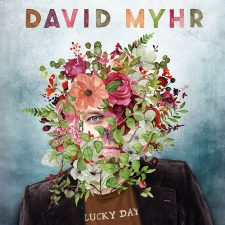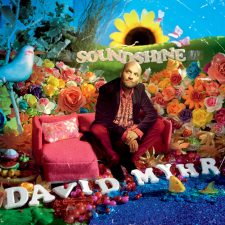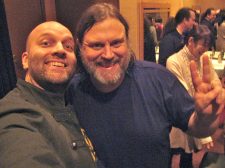David Myhr is the kind of artist where, after you’ve heard him once, you want to hear more. One gets the impression he takes great pains to make his music – compact, always melodic – while making said music sound effortless. It’s a hard balance to strike. Some musicians sound like they didn’t put enough work into it, while others sound like they’ve gone overboard. Myhr, for more than 25 years, has been hitting the target dead center, both in his solo work and where he began, with the band The Merrymakers in Sweden in the 1990s.
 If neither The Merrymakers nor Myhr himself strikes up a memory for you, don’t worry. The U.S. was, for the majority, completely in the dark on both, but not entirely. Small, but rabidly loyal pockets of fans emerged, including the founders of the International Pop Overthrow festival and member of the cult band Jellyfish, Andy Sturmer. (Sturmer worked with The Merrymakers on the song “April’s Fool” from the Bubblegun album.)Also, there have been significant gaps between recordings, precipitated by the obvious requirements of being an artist but not a megastar.
If neither The Merrymakers nor Myhr himself strikes up a memory for you, don’t worry. The U.S. was, for the majority, completely in the dark on both, but not entirely. Small, but rabidly loyal pockets of fans emerged, including the founders of the International Pop Overthrow festival and member of the cult band Jellyfish, Andy Sturmer. (Sturmer worked with The Merrymakers on the song “April’s Fool” from the Bubblegun album.)Also, there have been significant gaps between recordings, precipitated by the obvious requirements of being an artist but not a megastar.
Prepare to get your next second chance. Myhr has just released his second solo disc through the UK Lojinx label, Lucky Day. MusicTAP had the opportunity to speak with Myhr about this and many other subjects.
There was a significant time difference between the release of your first solo album, Soundshine, and the latest, Lucky Day. What happened in between then?
That’s very true! It does take a long time between records for me. The thing is, first of all, I need to be able to afford it. It costs a lot to record an album when you do it the “old school” way like I prefer. You know, with real musicians in real studios with real producers. And unfortunately, very little (if any) money comes back in a time when people are not buying records anymore. But it’s also a matter of finding the time for it. I do have a day job as a senior lecturer at a music university and also a wife and a cat that I must not forget to take care of.
 When I look back on it now I realize that work on the album didn’t even start until 2015 when I did a co-writing trip to the U.S. (that, by the way, was an amazing experience!). It was then when the idea was born to come back and record the whole album with Brad Jones. That didn’t materialize until eight months later. And once the basic tracks were recorded I wanted to bring the tracks home to polish them over a period of a few more months (whenever I could find the time for it). And once that was done, the search for a great album cover began, which also took a surprisingly long time. And finally, I had to make sure that my label Lojinx wouldn’t be too busy with other artists so they would have time to work on the promotion of the album which kind of delayed it another few months. It is important, after having put so much effort into an album, to make sure it’s done properly and not stress the release. Well, there you go… there are a few explications as to why it has taken some time! However, we must not forget that between the Merrymakers’ Bubblegun and my solo debut Soundshine there were fourteen( !) years of ”silence” (except writing for other artists like Puffy AmiYumi and stuff like that). So I feel like I’ve at least managed to up the tempo a little bit!
When I look back on it now I realize that work on the album didn’t even start until 2015 when I did a co-writing trip to the U.S. (that, by the way, was an amazing experience!). It was then when the idea was born to come back and record the whole album with Brad Jones. That didn’t materialize until eight months later. And once the basic tracks were recorded I wanted to bring the tracks home to polish them over a period of a few more months (whenever I could find the time for it). And once that was done, the search for a great album cover began, which also took a surprisingly long time. And finally, I had to make sure that my label Lojinx wouldn’t be too busy with other artists so they would have time to work on the promotion of the album which kind of delayed it another few months. It is important, after having put so much effort into an album, to make sure it’s done properly and not stress the release. Well, there you go… there are a few explications as to why it has taken some time! However, we must not forget that between the Merrymakers’ Bubblegun and my solo debut Soundshine there were fourteen( !) years of ”silence” (except writing for other artists like Puffy AmiYumi and stuff like that). So I feel like I’ve at least managed to up the tempo a little bit!
Lucky Day, while still firmly being a David Myhr recording, has a lot of distinct differences from Soundshine. To my mind, Soundshine had to act as a bit of reintroduction to the audience, so there seemed to be an aspect (in a good way) of reminding listeners of your prior association with The Merrymakers. Lucky Day seems to not be as consciously oriented that way. Many of the songs fall confidently in the singer/songwriter vein. Is this a fair characterization?
Yes, I think you’re absolutely right in that! Quite a few of the songs on Soundshine were songs that I either tried to write as potential ”singles” to pitch to Japanese artists (like before mentioned Puffy AmiYumi). Or was songs that I hoped that my bandmate Anders would like and that we could record as Merrymakers songs but which didn’t happen. I guess he thought they were to ”predictable” or too power pop or something. But still, they were my ”babies.” Songs that I had been writing over a ten years period. And I really wanted to get those melodies out one way or another. So, in that sense, it wasn’t as much of an attempt to write a really great album. It was more a matter of ”let’s see which left-overs I’ve got” once I was free to record my own album after Anders and I (the two remaining The Merrymakers) decided to go separate ways. It was like suddenly all my songs were approved. By myself! So the collection of songs were definitely marked by their time in the sense that I was still a ”Merrymaker” when I wrote them.
 The new album, on the other hand, is completely based around new songs that I’ve been writing in the last few years, mostly together with others, mainly American writers. The possibility to work that way is a newfound, and quite incredible freedom. As much as I loved writing with Anders and Peter in The Merrymakers back in the 90’s it really feels like I’ve entered a new chapter where I can write with just about anyone I feel like (as long as they’re up for it in their turn of course!). In total I had fourteen tracks written and recorded. There were a few more obvious powerpop tracks that were left out. Largely because my label Lojinx encouraged the more mellow and mature side of my artistry for a change and in hope to reach out to a new audience. However, I must admit I’m personally very fond of those more power-poppy tracks as well so it’s not unlikely they will show up on a future release.
The new album, on the other hand, is completely based around new songs that I’ve been writing in the last few years, mostly together with others, mainly American writers. The possibility to work that way is a newfound, and quite incredible freedom. As much as I loved writing with Anders and Peter in The Merrymakers back in the 90’s it really feels like I’ve entered a new chapter where I can write with just about anyone I feel like (as long as they’re up for it in their turn of course!). In total I had fourteen tracks written and recorded. There were a few more obvious powerpop tracks that were left out. Largely because my label Lojinx encouraged the more mellow and mature side of my artistry for a change and in hope to reach out to a new audience. However, I must admit I’m personally very fond of those more power-poppy tracks as well so it’s not unlikely they will show up on a future release.
With all this said, I do want to remind readers and listeners that although it’s easy to believe, that The Merrymakers was actually never 100% about ”power pop.” At least not in the way that there was ”power” to everything. Already on the first album we had really soft and kind of ”singer/songwriter”-ish numbers like my own ”Smiling In The Sky” (about my brother who died when he was twenty-two). And Anders’ reflective ”Shine Your Light On Me.” And on Bubblegun there was, for example, this beautiful ballad by Anders called ”Adore” which in a parallel world, at least in my opinion, should have been a classic number by now along some of the best by, say, Crowded House.
What preoccupies your writing themes now that may not have earlier in your career, and are you surprised by any of these changes?
Before I start to talk about my lyric writing, I must begin by admitting I’m mainly melody-driven. For me, it’s the melodies that get to me and speak to my heart and soul. I was commenting to my tour mate Linus of Hollywood the other day in the car that I love Bob Dylan even without even bothering to listen carefully to the lyrics. That says a lot, doesn’t it? It’s true though that it’s extra incredible when a brilliant melody is married to an outstanding lyric. But there are so many McCartney or E.L.O. songs that I absolutely love without having closely analyzed their content. ”It’s a living thing. What a terrible thing to lose!”. ”Sunday’s on the phone to Monday. Tuesday’s on the phone to me. Oh yeah!” I mean, what’s all that about? I have no idea! But I love it!
 So, as for themes in my lyric writing, I don’t know. For me, it’s a struggle each time and a puzzle that has to be solved one way or another. Many times I rely on help from my co-writers. I remember having written the entire melody for the (dare I say it) ”power ballad” on Bubblegun. I was at my day job at Sony Music Publishing and Anders and Peter took upon themselves the task to put words to my melody. When the day was over they called me and said ”–OK, the lyrics are finished now. Your song is now called “Monkey in the Middle.” To this day I don’t really know exactly what the song is about but I love singing it and it sings well. Same thing with ”April’s Fool” that I wrote most of the melody for except the chorus melody which Andy Sturmer (ex-Jellyfish) helped us out with. I didn’t write many of those words but I absolutely love singing it. It’s tongue-in-cheek, it has a twist and again it sings incredibly well.
So, as for themes in my lyric writing, I don’t know. For me, it’s a struggle each time and a puzzle that has to be solved one way or another. Many times I rely on help from my co-writers. I remember having written the entire melody for the (dare I say it) ”power ballad” on Bubblegun. I was at my day job at Sony Music Publishing and Anders and Peter took upon themselves the task to put words to my melody. When the day was over they called me and said ”–OK, the lyrics are finished now. Your song is now called “Monkey in the Middle.” To this day I don’t really know exactly what the song is about but I love singing it and it sings well. Same thing with ”April’s Fool” that I wrote most of the melody for except the chorus melody which Andy Sturmer (ex-Jellyfish) helped us out with. I didn’t write many of those words but I absolutely love singing it. It’s tongue-in-cheek, it has a twist and again it sings incredibly well.
This is not to say that I never write lyrics that I’m proud of on my own. As I mentioned earlier ”Smiling In The Sky” was a heartfelt intent to try to deal with the loss of my older brother, where I had borrowed the title idea from a quote by Yoko Ono about where she thought her dear husband John was at the time. She said, ”I saw John smiling in the sky today.” I thought it was a beautiful way of thinking about lost loved ones so I used it to try to express my own big loss. But I’m not really a personal auto-biographic writer in that way. Before writing Soundshine my wife Paula wondered if there was ever going to be a song about her so I wrote ”The One” for her. Subconsciously I did write a couple of love songs for her on the new one as well. ”The Perfect Place” and ”The Only Thing I Really Need is You.” I tend to lean towards basic, romantic stuff in my themes. Including lost love, of course, like in ”Lovebug” and ”Every Day It Rains.”
To sum it up, in answer to your question, not considering my self first and foremost a lyricist I wouldn’t be able to say there’s a different ”theme” to my songs now than there was before. So, therefore, I couldn’t exactly say I’m surprised either.
Who is performing with you on the album?
Well, the basic tracks were recorded together with my two fantastic co-producers Brad Jones and Andreas Dahlbäck. Brad plays the bass on all tracks and also does a little bit of everything here and there, like for instance kazoo (”My Negative Friend”), recorders and vibraphone (”My Negative Friend”), harmonium (”If you really think it’s over”), vibraphone (”Lovebug”) just to give a few examples. Andreas does all the drums on the record (except one) and a lot of percussion and stuff. On the basic tracks, we also had Nashville session guitar phantom Pat Buchanan, who has played with just about everybody, sit in on electric and acoustic guitars. I do play a lot of stuff myself. Acoustic and electric guitars on most of the songs, piano (”My Negative Friend”, ”Room To Grow”) , Wurlitzer (”Lucky Day”, ”Room To Grow”), Mellotron (”The Perfect Place”) and even a little bit of mandolin (”If You Really Think It’s Over”) which is something I only do like once every ten years.
So the four of us did most of the playing on the album but then Bleu helped me out (in an incredible way!) with backing vocals on the song he co-wrote (”Jealous Sun”), just like Bill DeMain, Linus of Hollywood, Steve Schiltz, and Jimmy Lagnefors on the songs they co-wrote. Mikael Bäckman played a great Stevie Wonderesque harmonica solo on ”Room To Grow”, Steve Schiltz played a bunch of stuff on the song idea he brought in (”Every Day It Rains”) including bass and drums. Theo Stocks played some pedal steel on a couple of tracks and there are other people involved as well on strings and other additional stuff. For a full credit list (which I do encourage everyone to get!) one has to get the LP, CD or the digital booklet on iTunes.
A song on the new record is called “My Negative Friend” and is a reminder from one friend to another – or one to an audience – to not feel doomed by the times in which we live. Do you feel that, at least in terms of the world of music, that negativity has taken hold? There’s certainly a lot of it in other mediums…
It’s a very difficult question and it’s very dangerous to generalize. I mean, to begin with – what is ”the world of music?” When I think about the music business there are certainly a lot of reasons to be negative. It’s more difficult than ever to make a living out of recorded music. People (myself included) are used to paying nothing or at least very little for having (almost) all of the recorded music in the history at their fingertips. As an artist wanting to pay all the people I hire in order to reach my creative goals it’s almost impossible to reach even a break-even. Not to mention get compensated for all the countless weeks and months of work I put into it. Then, once it’s done, each song is supposed to be accompanied by its own video (which also costs money). And then, to get people to even see the videos or hear the songs, Facebook wants me to ”sponsor” my own posts on my own page just to reach out to my own likers. So as a struggling artist it’s incredibly tough from an economic perspective. On the other hand, there are reasons to be positive. Twenty years ago it was up to ”the A&R guy” (yes, it was almost always a guy) to say if your music was worth to be recorded at all in the first place. And secondly, it IS possible to record music in a cheap way today if you’re a talented multi-instrumentalist, engineer, producer, mixer, and mastering engineer in one person. There’s a lot of ”hats” to wear but some people do it. I could wear a few of them, but personally, I prefer to build a little team of creative and talented people around myself like I’ve done on Lucky Day. The end result would never have been as good had I tried to do it all by myself.
 Music business aside, I must say I think there’s a lot of positivity among people dedicating their lives to music. It’s a love and passion for so many people and in this day and age, it’s something that almost anyone can do. As long as you’re not trying to make it your livelihood I think we can all agree it’s one of the most fulfilling things you can spend your time doing. If you’re into it of course. Like John Lennon once said: ”–Some people like to play ping-pong.” So, let them play ping-pong. But for us that have music as our passion, let’s just keep the music coming!
Music business aside, I must say I think there’s a lot of positivity among people dedicating their lives to music. It’s a love and passion for so many people and in this day and age, it’s something that almost anyone can do. As long as you’re not trying to make it your livelihood I think we can all agree it’s one of the most fulfilling things you can spend your time doing. If you’re into it of course. Like John Lennon once said: ”–Some people like to play ping-pong.” So, let them play ping-pong. But for us that have music as our passion, let’s just keep the music coming!
Someone asked Paul McCartney why he’s still out there playing live and making records and his reply was something along the lines of ”–What else should I do? Sit at home and watch TV? Play golf?” Even if our economic realities are somewhat different I have the same attitude myself. I do it because I love it! And my experience is that it’s the same for just about every other musician/songwriter/producer. We’re not in it for the money in the first place (although it would certainly help to get your invested money back). So, no, negativity has not taken hold!
The songs on Lucky Day are compact. “Every Day It Rains” is the longest track, and that’s barely at 4 minutes and 2 seconds. When you are writing, how conscious are you of structure, and do you impose rules upon yourself in your process? It seems to me that your songs say a lot, but they don’t overstay their welcome. Such an economy is a good quality to support in songwriting.
Well, first of all, thank you for those kind words! As a teacher of songwriting, I do have to admit that I’m very aware that the cliché of ”leave them with a taste for more” is certainly valid. One of my favorite power-pop songs of all time ”American Girl” only has two choruses! How could I ever get tired of listening to that? I am a very impatient listener myself and if a song is over four minutes it better has a reason to be that long. ”Bridge Over Troubled Water” comes to mind. But that’s an epic song. Anything that isn’t epic (”Hey Jude”, ”Stairway to Heaven”, ”Bohemian Rhapsody”) should probably try carefully to stay within the 3 to 3.5-minute gap. I mean someone made a long list of incredible songs that are two minutes and forty-two seconds (”There She Goes” by The La’s, ”Don’t Do Me Like That” by Tom Petty, ”Lovely Rita” by The Beatles, ”California Dreaming” and so on). On my record, I come pretty close with ”My Negative Friend” being 2:40 and ”Lovebug” 2:41.
 With all this said, I’m not over-thinking it during the actual process of writing. But I do get worried if I see that the song starts to be long. ”Everyday it rains” was actually one of these cases. It was originally like five minutes long and I thought ”that’s too much”. And so did Brad and Andreas, so they helped me make it shorter. But most of the times it comes naturally. From a gut-feeling.
With all this said, I’m not over-thinking it during the actual process of writing. But I do get worried if I see that the song starts to be long. ”Everyday it rains” was actually one of these cases. It was originally like five minutes long and I thought ”that’s too much”. And so did Brad and Andreas, so they helped me make it shorter. But most of the times it comes naturally. From a gut-feeling.
As for structure, I’m usually not very experimental I guess. I remember working with the cover of Elvis Costello’s (and McCartney’s) ”Veronica” and I was kind of shocked that the bridge came before the second chorus. I thought to myself ”is this allowed?”. Then when I presented the song Jimmy Lagnefors and I had written (”If You Really Think It’s Over”) to Brad Jones he suggested that very same idea. Again, I was kind of shocked, but now it was the second time for me, so I said ”-oh yeah? OK!”).
So, no, I try not to make rules. But one could definitely call me a traditionalist.
At the same time, do you have a sense in the songwriting process where you hit completion or a feeling that “this is everything I need this song to be,” or do you reach a point where you don’t feel the song can go any farther and one hopes for the best? I once spoke to a songwriter who paraphrased, “Albums aren’t released, they escape.” It suggests that the writer has only a finite amount of control over the process and the rest is serendipitous.
As soon as every note, chord, and word feels incredibly great it’s done! Easy? No, not at all. But the closest to the answer to the question I can think of.
 What are your plans throughout the year in regard to supporting Lucky Day?
What are your plans throughout the year in regard to supporting Lucky Day?
The album was released on May 18th and was forgone by three months of trying to create a ”hype” on social media by releasing something every Friday. Lyric videos for ”Jealous Sun” and ”The Perfect Place.” A real video for ”My Negative Friend.” Live clips. Spotify playlists. And so on…
 In May, I had a release party for the album with an incredible backing band consisting of the album’s drummer and co-producer Andreas Dahlbäck, as well as my pop colleagues Peter Morén (of Peter Bjorn and John fame) and Peter Kvint (one of Sweden’s most successful songwriters/producers who makes his solo debut this year worth checking out) and a couple of the best session players around (Jerker Odelholm, bass / Rasmus Lindelöw, keyboards). A fantastic evening. Apart from that, I’ve done radio interviews (and live performances) in Gothenburg and in the north of Sweden (where I’m from). I also made a promo tour of Spain in June (including a one-hour interview on national radio and gigs in Madrid and Burgos). I just finished a joint tour under the umbrella name of Melody & Madness together with my peers Linus of Hollywood and Chris Price (both which I’m a big fan of) where we played a string of shows on the U.S. west coast (San Diego, L.A., San Jose, San Francisco, Portland). I have yet to figure out how to support the album in Japan where it’s also released. Would love to come back there to present the new songs live! I also have a couple of shows planned in the fall here in Sweden.
In May, I had a release party for the album with an incredible backing band consisting of the album’s drummer and co-producer Andreas Dahlbäck, as well as my pop colleagues Peter Morén (of Peter Bjorn and John fame) and Peter Kvint (one of Sweden’s most successful songwriters/producers who makes his solo debut this year worth checking out) and a couple of the best session players around (Jerker Odelholm, bass / Rasmus Lindelöw, keyboards). A fantastic evening. Apart from that, I’ve done radio interviews (and live performances) in Gothenburg and in the north of Sweden (where I’m from). I also made a promo tour of Spain in June (including a one-hour interview on national radio and gigs in Madrid and Burgos). I just finished a joint tour under the umbrella name of Melody & Madness together with my peers Linus of Hollywood and Chris Price (both which I’m a big fan of) where we played a string of shows on the U.S. west coast (San Diego, L.A., San Jose, San Francisco, Portland). I have yet to figure out how to support the album in Japan where it’s also released. Would love to come back there to present the new songs live! I also have a couple of shows planned in the fall here in Sweden.
Where can people find digital versions and physical CDs of Lucky Day?
The one place that I would encourage people to go to is my beloved label Lojinx. It’s as easy as going to lojinx.com and searching my name. Lojinx is, in my opinion, the coolest label in the world that also has the best taste. I mean where else can you find a great combination of artists such as The Posies, Pugwash, Brendan Benson, Fountains of Wayne, Josh Fix, Bleu, Marshall Crenshaw, Mike Viola, Bill DeMain, etc.? But I would also encourage people to hassle their local record store! They certainly need all the support they can get and they should be able to get Lucky Day in whatever traditional way they use through distributors worldwide.